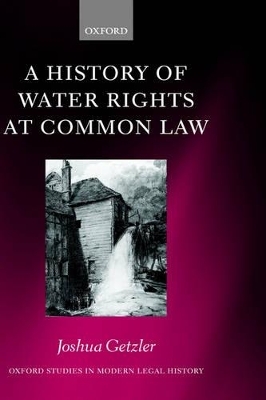
A History of Water Rights at Common Law
Seiten
2004
Oxford University Press (Verlag)
978-0-19-826581-8 (ISBN)
Oxford University Press (Verlag)
978-0-19-826581-8 (ISBN)
Describes how the courts created rights for land owners and users competing to appropriate water for factories, town supply, drainage, and transport. This book covers the period from early times to the late 19th century, illustrating the changing common law of property and tort, and throwing light on the growth of the economy.
Water resources were central to England's precocious economic development in the thirteenth and sixteenth centuries, and then again in the industrial, transport, and urban revolutions of the late eighteenth and early nineteenth centuries. Each of these periods saw a great deal of legal conflict over water rights, often between domestic, agricultural, and manufacturing interests competing for access to flowing water. From 1750 the common-law courts developed a large but unstable body of legal doctrine, specifying strong property rights in flowing water attached to riparian possession, and also limited rights to surface and underground waters.
The new water doctrines were built from older concepts of common goods and the natural rights of ownership, deriving from Roman and Civilian law, together with the English sources of Bracton and Blackstone. Water law is one of the most Romanesque parts of English law, demonstrating the extent to which Common and Civilian law have commingled. Water law stands as a refutation of the still-common belief that English and European law parted ways irreversibly in the twelfth century. Getzler also describes the economic as well as the legal history of water use from early times, and examines the classical problem of the relationship between law and economic development. He suggests that water law was shaped both by the impact of technological innovations and by economic ideology, but above all by legalism.
Water resources were central to England's precocious economic development in the thirteenth and sixteenth centuries, and then again in the industrial, transport, and urban revolutions of the late eighteenth and early nineteenth centuries. Each of these periods saw a great deal of legal conflict over water rights, often between domestic, agricultural, and manufacturing interests competing for access to flowing water. From 1750 the common-law courts developed a large but unstable body of legal doctrine, specifying strong property rights in flowing water attached to riparian possession, and also limited rights to surface and underground waters.
The new water doctrines were built from older concepts of common goods and the natural rights of ownership, deriving from Roman and Civilian law, together with the English sources of Bracton and Blackstone. Water law is one of the most Romanesque parts of English law, demonstrating the extent to which Common and Civilian law have commingled. Water law stands as a refutation of the still-common belief that English and European law parted ways irreversibly in the twelfth century. Getzler also describes the economic as well as the legal history of water use from early times, and examines the classical problem of the relationship between law and economic development. He suggests that water law was shaped both by the impact of technological innovations and by economic ideology, but above all by legalism.
Joshua Getzler is a Fellow and Tutor in Law at St Hugh's College, Oxford.
Introduction ; 1. The Exploitation of Water in Historical Perspective ; 2. Servitude Doctrine in Early Law ; 3. The Common Law of Riparian Rights 1580-1750 ; 4. Blackstone and Hale's Doctrines of Land and Water Use ; 5. Appropriation Theory in the Courts ; 6. Establishment of the Modern Riparian Doctrine ; Conclusion ; BIBLIOGRAPHY ; INDEX
| Erscheint lt. Verlag | 29.1.2004 |
|---|---|
| Reihe/Serie | Oxford Studies in Modern Legal History |
| Verlagsort | Oxford |
| Sprache | englisch |
| Maße | 161 x 241 mm |
| Gewicht | 761 g |
| Themenwelt | Geschichte ► Teilgebiete der Geschichte ► Wirtschaftsgeschichte |
| Recht / Steuern ► Allgemeines / Lexika | |
| Recht / Steuern ► EU / Internationales Recht | |
| Recht / Steuern ► Privatrecht / Bürgerliches Recht ► Sachenrecht | |
| Technik | |
| ISBN-10 | 0-19-826581-6 / 0198265816 |
| ISBN-13 | 978-0-19-826581-8 / 9780198265818 |
| Zustand | Neuware |
| Haben Sie eine Frage zum Produkt? |
Mehr entdecken
aus dem Bereich
aus dem Bereich


